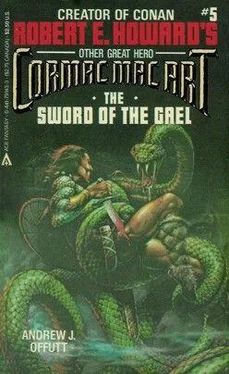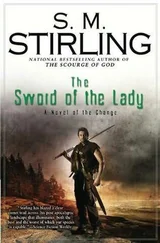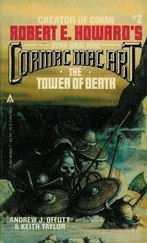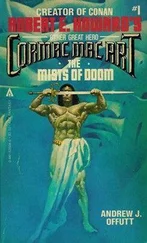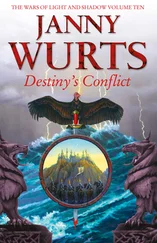Andrew Offutt - The Sword of the Gael
Здесь есть возможность читать онлайн «Andrew Offutt - The Sword of the Gael» весь текст электронной книги совершенно бесплатно (целиком полную версию без сокращений). В некоторых случаях можно слушать аудио, скачать через торрент в формате fb2 и присутствует краткое содержание. Жанр: Фэнтези, на английском языке. Описание произведения, (предисловие) а так же отзывы посетителей доступны на портале библиотеки ЛибКат.
- Название:The Sword of the Gael
- Автор:
- Жанр:
- Год:неизвестен
- ISBN:нет данных
- Рейтинг книги:3 / 5. Голосов: 1
-
Избранное:Добавить в избранное
- Отзывы:
-
Ваша оценка:
- 60
- 1
- 2
- 3
- 4
- 5
The Sword of the Gael: краткое содержание, описание и аннотация
Предлагаем к чтению аннотацию, описание, краткое содержание или предисловие (зависит от того, что написал сам автор книги «The Sword of the Gael»). Если вы не нашли необходимую информацию о книге — напишите в комментариях, мы постараемся отыскать её.
The Sword of the Gael — читать онлайн бесплатно полную книгу (весь текст) целиком
Ниже представлен текст книги, разбитый по страницам. Система сохранения места последней прочитанной страницы, позволяет с удобством читать онлайн бесплатно книгу «The Sword of the Gael», без необходимости каждый раз заново искать на чём Вы остановились. Поставьте закладку, и сможете в любой момент перейти на страницу, на которой закончили чтение.
Интервал:
Закладка:
Cormac nodded, walking blindly now, heedless of the dusty road, the pretty blue and yellow summerflowers, the trees that became more and, more numerous, the bilberry and heath that paralleled their path, beneath a bright smiling July sun.
My woman , he mused, nor was he any the happier about it than the tallish youth walking proudly beside him. Samaire, daughter of a king, sister of a king, widow of a prince. No, Cormac, exile and riever of the coasts, it’s not your woman that royal beauty is, and she’ll never be. Have a care, landless exile, for ye be too old to be so foolish as this poor silly youth, with his head all swollen full of himself!
And ye want this woman , he told himself, it were better ye laid hands on her now, and backward ran with all your might, to put to sea with her in that Pictish boat. For chances of keeping her, and happily were better in that wise than this. If I clear myself, and aid them to confront their dark brother and mayhap gain for Ceann the crown of Leinster… well, it might well be as general of Leinster’s armies I wear my sword. But not as the husband of a princess, no matter how fine a friend her royal brother is!
In silence they walked, each in communion with the interior of his own head and their separate and common future. Afoot in southern Munster of Eirrin, a strange procession indeed: The fisherman’s son Dondal in his Pictish armour, and the exiled winner of a hundred battles with his scarred face and his narrow eyes, and the royal heirs of Leinster’s high throne!
Chapter Twelve: The Prince of Munster
Crom was their day-god,
and their thunderer,
Made morning and eclipse;
Brigit was their queen of song,
and unto her
They prayed with fire-touched lips.
– D’Arcy McGee: The Celts
Munster was rolling country, and the four pilgrims had well known it to this day. To their west had reared Galti Mor, pushing upward three thousand feet. Eastward was the lesser Comeragh range of hogbacks, while the travelers had made their way between, along the foothills of the Knockmealdown Mountains. They had seen few other travelers; this was a hard-working season for farmers, with both birds and bugs as anxious for their crops as they.
Little Kilsheed of Munster boasted perhaps a hundred houses that had grown out of four or five raths in times gone by. The village lay, sleepy in the sun, on the banks of the Suir. Northward of Kilsheed on this same river rose Cashel, the first destination on their journey north and then east to Tara.
In addition to its multicoloured homes and sprawling markets both open and closed and the tiniest of military garrisons, Kilsheed held precisely one inn. It was into its smoky, grease-walled interior the four repaired, under the broken sign of the Moondisk. A family of locals, doubtless celebrating something or other, left as they entered, and Cormac led the way to the vacated table. They gained attention: they were travelers. People smiled when they looked upon Ceann with his smallharp, and his dark red hair; men looked well and long at Samaire, with her exotic boots. They vanished enticingly up under an overlarge tunic that still did not disguise her slender and entirely womanly figure.
There were no smiles for Cormac-save that of a slatternly wench with overpainted face and nails like drops of blood tipping her long snowy fingers. The smiles occasioned by Dondal were of an entirely different sort. People nudged each other, and muttered. The young did not notice. Cormac felt that even if Dondal had, he’d have thought the people awed and commenting on his handsome build and martial appearance.
They were served fair ale, excellent bread, and greasy pork, ambushed in more grease lumpy with leeks striving to smother the meat. A happy-faced man, fat and ruddy, came bustling from the kitchen to welcome them. He advised that it was his own tender daughter serving them and he responsible for her and them, and to tell them he had fine accommodations for their over-nighting.
Beneath smoke- and grease-darkened rafters, Cormac looked about himself.
The fellow alone in the corner was a priest of the new faith, and though he nodded and almost smiled, Cormac vouchsafed him none but a sour look, and that quickly passing. Against the wall a dour man sat, the hood of his cloak drawn up to forbid interruption while he brooded over his ale. A smallharp stood against the wall beside him, but he made no move to pick it up and play, nor did he more than glance their way; he was manifestly interested in nothing and no one, including his fellow minstrel just arrived. Nearby three soldiers lounged, swaggering and noisy. The leg of one was stretched arrogantly out so that the landlord’s daughter must be aware of it with each of her journeys to the kitchen and back.
There were no other patrons. And the biggest of the three soldiers, a man perhaps just at the age of thirty, kept his pale eyes fixed rudely on Samaire. Cormac looked at her, to see what the fellow was staring at.
A woman with the highness of pride in eyes and bearing, Cormac told himself. And those eyes blue as any flower of Eirrin’s fair summer. Lips, he thought in the poetic manner of his ancestors, red as the berries of the rowan-tree, and her hair like a king’s cloak of new gold or the sun just before it sets. And a face and form to cause a man’s body to twitch.
The soldier’s body, Cormac mac Art decided, was atwitch. He continued staring. Samaire had noticed. Obviously uncomfortable, she was keeping her eyes on her food. Ale-jack in hand, Cormac twisted half about to return the soldier’s stare. It was many long seconds before the man noticed or deigned swerve his gaze from Samaire to the dark-haired man with the scarred face and eyes invisible in their slits.
For a time the two men traded looks, the soldier’s insolent and Cormac’s dark and warning. Then, without swerving his gaze, the man spoke to his companions. As he did, he nodded their way-or rather Samaire’s. The other soldiers laughed.
Nodding, one said, “And scratch like a cat in heat once she’s on her back too, I’d be saying!” The others laughed and nodded. When they fell silent, it was Cormac who spoke, from a distance of eight or so feet.
“But it’s nothing ye’d be best advised to be saying little man. Cats abound; find one and get scratched.”
All three weapon-men blinked. The dark speaker had not raised his voice, and his tone was matter-of-fact. His ale was still held carelessly in his big hand, which bore a small poultice to draw or ward off some infection endangering him.
With the merest hint of the ghost of a smile’s shadow, Cormac turned back to his companions. He lifted his alejack. Ceann looked at him; Samaire at her trencher; Dondal past Cormac, at the trio of king’s men. They were muttering, but Cormac recognized the way of men who intend to be overheard.
“-and none among the three of them man enough for her!”
“I know three more who’d rise to the occasion!” Laughter.
“Cormac-” Dondal began quietly, looking very nervous indeed.
“Eat, Dondal. Drink. They launch words to provoke. I’ve heard crows before-and the braying of asses.” Cormac’s voice was loud as the soldiers’.
Behind him silence, then a long, sucked in “Eeeeeeeeh,” followed by a pause and an aspirated “Ha-awwwwwwwwn!” A passing good imitation of the animal mentioned.
Samaire anxiously lifted her eyes, keeping her head down, to Cormac’s face. He smiled. She returned to pushing her food around, desperately keeping her attention thereon.
“I suggest either a walk or that we repair to whatever rooms he has for us,” Cormac said quietly. “We needn’t stay here, and I’m not anxious to fall afoul of a weapon-man of Munster’s king!” He turned in his little chair, away from the insolent trio. The innkeeper’s daughter was standing near the kitchen, watching, and she started his way before Cormac could speak.
Читать дальшеИнтервал:
Закладка:
Похожие книги на «The Sword of the Gael»
Представляем Вашему вниманию похожие книги на «The Sword of the Gael» списком для выбора. Мы отобрали схожую по названию и смыслу литературу в надежде предоставить читателям больше вариантов отыскать новые, интересные, ещё непрочитанные произведения.
Обсуждение, отзывы о книге «The Sword of the Gael» и просто собственные мнения читателей. Оставьте ваши комментарии, напишите, что Вы думаете о произведении, его смысле или главных героях. Укажите что конкретно понравилось, а что нет, и почему Вы так считаете.
